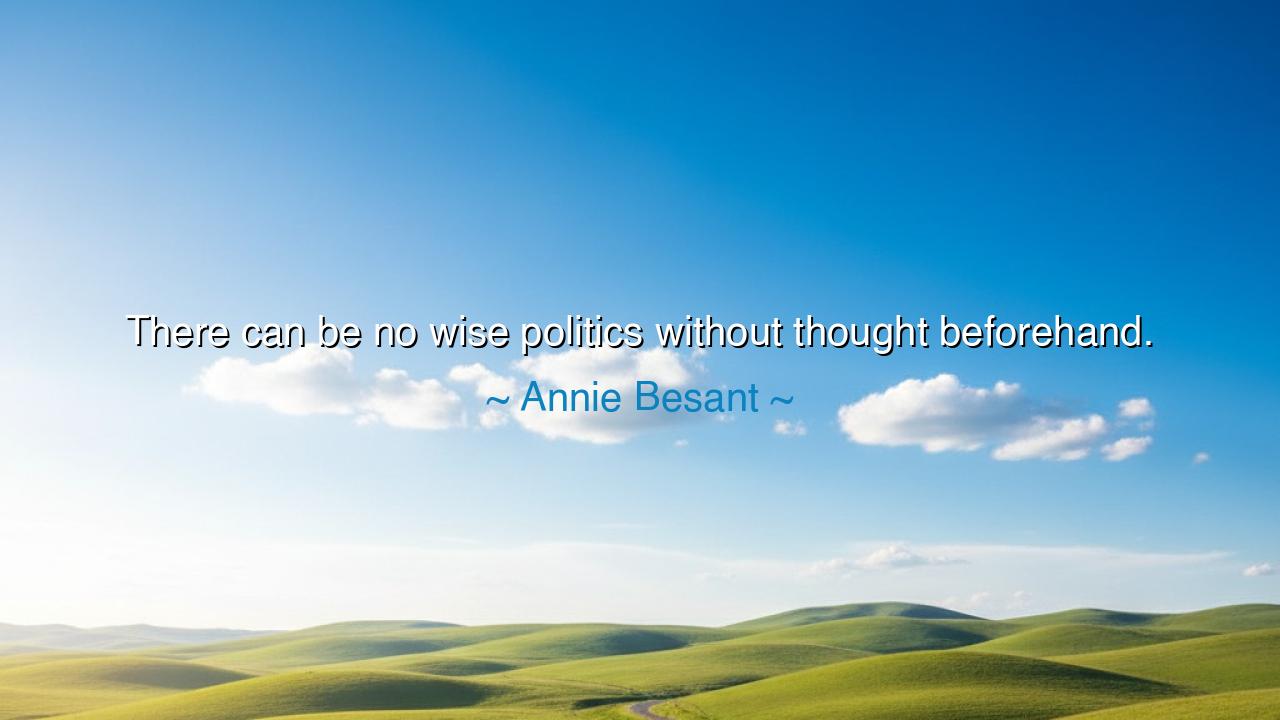
There can be no wise politics without thought beforehand.






The words of Annie Besant — “There can be no wise politics without thought beforehand.” — rise like a stern commandment from the lips of one who was both a reformer and a revolutionary. Besant, a champion of women’s rights, education, and Indian self-rule, spoke from the battlefield of ideas, where hasty action without vision had too often led to ruin. Her wisdom is a reminder that power without reflection is reckless, and that true leadership must be born from thought, not impulse.
The meaning strikes at the heart of governance. To engage in politics is to shape the fate of nations, to bear responsibility for the lives of millions. Yet without preparation, foresight, and the discipline of reason, such politics becomes nothing more than chaos adorned with slogans. The wise statesman does not act on passion alone, but considers consequences, weighs principles, and seeks the greater good beyond the hunger of the moment.
History proves this lesson with clarity. In the years after the French Revolution, fiery rhetoric and unmeasured zeal overthrew monarchy, but without thought to guide the republic, terror consumed the land. Liberty was promised, yet the guillotine reigned. By contrast, the architects of the American Constitution, though imperfect men, spent long months in debate and reflection, crafting a framework grounded in thought that has endured centuries. In their patience lies the truth of Besant’s words: freedom requires more than passion; it requires preparation.
Besant herself embodied this truth. She did not merely cry for reform; she studied philosophy, science, and religion, arming herself with thought before stepping into battle with words and deeds. Whether speaking for the poor of London or for the independence of India, she understood that wise politics demands not only courage, but clarity of vision. Her own life testified that careful reflection strengthens action, while rashness weakens it.
Let this wisdom endure: all who seek to lead must remember that the fire of politics must be tempered by the calm of thought. For without foresight, revolutions devour their children, and governments betray their people. Annie Besant’s voice carries across generations — urging rulers and citizens alike to pause, to think, to plan, before they act. For only then can wise politics be born, and only then can nations endure in justice and peace.






Ttranduonggiahan
Besant's quote makes me reflect on the current state of politics and the quick decisions that often leave long-term consequences. If wisdom in politics truly comes from thoughtfulness, are we failing to address the bigger issues due to a lack of strategic thinking? What do you think—can political systems function effectively if they’re not rooted in foresight and considered planning?
CPCheo pao
This quote challenges the rushed nature of modern politics. It suggests that wise decisions are rooted in careful thought, but I wonder: How often do we see politicians rushing through policies, only to later regret their decisions? What structures can we put in place to ensure that politics and policy-making prioritize reflection and long-term strategy over quick wins and short-term popularity?
BTNguyen Ngoc Bao Thu
Annie Besant’s words are a reminder that successful politics cannot be based on knee-jerk reactions or populism. Thoughtful, informed decisions are what can truly drive progress. But how often do we see politicians making decisions based on polls or party lines rather than deep reflection? Could the lack of ‘thinking beforehand’ be one of the reasons why many political decisions end up having unintended negative consequences?
KLIchigo Khanh Linh
This quote really resonates with the current political climate. It seems that political decisions are often made in haste, without thinking through the long-term impact. Can real wisdom in politics only come from those who take time to reflect, plan, and understand the broader consequences of their choices? How can we instill more thoughtful decision-making in the political process, especially when there’s so much pressure for quick results?
TNHoang Thuy Nguyen
I agree with Besant’s statement, but I also wonder if there’s ever truly enough time for 'thought beforehand' in the fast-paced world of politics. Is there a danger in overthinking, where delay leads to missed opportunities? How do we balance the need for careful consideration with the need for timely action in a constantly evolving political landscape?